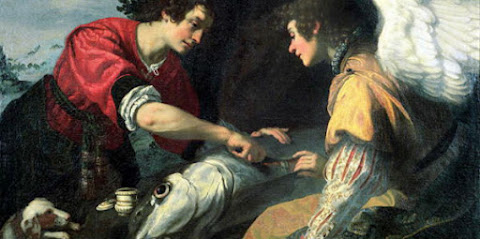The Lord said to my lord,
‘Sit at my right hand
until I place your enemies under your feet.’
Psalm 110 which Jesus quoted was understood to refer to the Messiah. It had a limited fulfillment in David's son Solomon when David resigned from kingship to make way for his son to rule. This was the historical sense in which David's own son was briefly his lord. But Solomon left much to be desired and so a more perfect fulfillment of this Psalm was anticipated. How, then, could the Messiah be both the son of David and his Lord?
David himself calls him ‘lord’;
so how is he his son?”
The great crowd heard this with delight.
Jesus was himself a descendent of David, a son of that royal ancestry, and so a potential heir to this promise. But he was also the Son of God, and therefore David's Lord in a way that was not temporary and flawed, but profound, permanent, and perfect. The crowd was delighted because they picked up the hints that there was more to the story of the Messiah than they had guessed. A mere royal descendent that united and freed Israel by military conquest would not have been David's lord. And so there must have been something better in store. As indeed there was.
David himself, inspired by the Holy Spirit
David likely had no sense of the full scope of the things he wrote by the prophetic Spirit. But God guided him just as he guided all of the writing of Scriptures, working with the knowledge and talent of those who wrote, but shaping it to be a cohesive and integrated vision of his covenant plan for salvation history. Neither David nor any other author had this full clear vision, yet the Spirit worked through what they wrote by adding layers that would make sense as the plan of salvation progressed.
The Lord permitted Israel to undergo much hardship before they saw their Messiah. He permitted much blindness and hardness of heart, but only so that the people could realize their need for God and to be ready to welcome his salvation. Sometimes we too are permitted to undergo trials. For us as well as for them God is able to make them work together for our good (see Romans 8:28), to more than make up for the suffering, to bring us to the place where every tear will finally be wiped away (see Revelation 21:4)
When Tobit saw his son, he threw his arms around him and wept.
He exclaimed, “I can see you, son, the light of my eyes!”
He allows blindness so that we can see him with new eyes. Let us hear the words of Tobiah telling us to have courage, confident that the Lord has a plan to heal us, that his angel is already on the way.
“Blessed be God,
and praised be his great name,
and blessed be all his holy angels.
May his holy name be praised
throughout all the ages,
Because it was he who scourged me,
and it is he who has had mercy on me.
Behold, I now see my son Tobiah!”

No comments:
Post a Comment